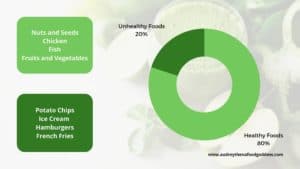This article is intended for informational purposes only. This article is not intended to diagnose or replace evaluation by a medical professional. I am not a registered dietician. Please consult a nutritionist or registered dietician if you are looking to make any changes to your current diet, lifestyle, or treatment plan.
Eating healthy is a practice that has eluded many of us. Having energy is no longer a reality that is common for the majority of individuals. In the days of fast food, frozen meals, candy, and fun restaurants, it can be so hard to find healthy food options or have enough energy to stay motivated and happy in our lives. Why eat steamed broccoli when you can go out with your friends and get fried chicken or Japanese ramen? That’s why I’ve listed the 7 healthy eating habits below – to give you tangible advice on how to increase your energy levels through healthy eating habits.
By developing a new lifestyle through habits, we can reap the many benefits of eating healthy. However, it’s important we first understand the implications of adopting these new practices.
Table of Contents
Pros and Cons of the 7 Healthy Eating Habits
There can be both pros and cons to healthy eating habits. Developing these healthy habits can help you become healthier by losing weight, having more energy, and experiencing less illness, like heart disease. However, negative effects can develop if you’re not careful. It’s important to not let these tips and tricks to eating healthy control you or how you live your life.
When we want to start a new habit, or achieve a new milestone, it’s easy to start obsessing over the habits or goals we set for ourselves. If we aren’t strict, rigid, or consistent with our new plans, it’s easy to beat ourselves up over it. This can lead to feelings of depression, failure, or even restriction in the case of healthy eating.
It’s important to use the healthy habits we learn and implement them to enhance our lives, rather than harm it in other ways. We can do this by taking a healthy mindset to our new healthy habits. Aim for progress, not perfection when implementing the tips below.
7 Healthy Eating Habits
1. Avoid Processed Foods
Eating more processed foods throughout the day and every day can increase your feelings of fatigue. In order to maximize your energy levels and stay healthy, you’ll want to get in the habit of avoiding or minimizing your consumption of processed foods.
Processed foods affect your energy levels because they tend to be extremely low in nutrients, high in calories, high on the glycemic index, and use unnatural ingredients (like added sugar) that cause inflammation and fatigue in the body.
Here are some more tips to help you avoid or minimize your consumption of processed foods:
Don’t keep processed foods in your house: Sometimes it’s hard to lose weight or eat healthy when you have all the treats in your house. Purge your house of all processed foods, and only buy enough of it when you want to treat yourself to a healthy serving.
Replace processed foods with healthy alternatives: Swap out your favorite snacks and meals for healthy food options. For example, if you really like potato chips, try making your own with whole potatoes and olive oil. If you like chocolate ice cream, try making your own banana chocolate nice cream.
Get in the habit of eating whole meals: When you eat whole foods, and meals large enough to keep you full and satisfied, you’ll have less cravings to eat salty and sweet snacks. Plus, if you cook from scratch and eat foods with less sodium, that can help with your overall cravings.
2. Eat Mostly Fruits and Vegetables
By eating fruits and vegetables, you’ll give your body the nutrients it needs to carry out core functions of the body. Fruits and vegetables are packed with micronutrients, like calcium, vitamin K, iron, folate, and others. By consuming these micronutrients on a regular basis, studies have shown it can significantly reduce your risk of chronic and premature health conditions.
It's recommended to eat at least five servings of fruits and vegetables per day. According to the USDA’s eating guidelines and their MyPlate model, they recommend that filling your plate half full with a variety of fruits and vegetables at every meal will improve and sustain optimal health. According to some experts, it’s even recommended to eat as many as 10 servings per day.
Many studies show that it’s also the variety of plants you eat that are just as important, if not more important, than the sheer volume you eat. For example, it’s going to be better for your long-term health to eat 10 servings of 10 different fruits and vegetables, than 10 servings of 1 vegetable.

3. Stay Hydrated Throughout the Day
Feelings of hunger often stem from being dehydrated. You can feel fuller longer when you drink water throughout the day. It’s recommended to get 9-10 cups of water per day. Some experts even challenge us to drink a gallon per day.
Drinking water can help you regulate a normal temperature, lubricate and cushion your joints, get rid of waste, keep you full, and increase your energy levels!
Tips to get more water into your day:
Carry a water bottle with you: By carrying a big water bottle with you everywhere you go, you can satisfy your thirst every chance you get. Having a water bottle encourages you to continuously drink throughout the day, rather than all at once. This has been proven to be healthier and help sustain energy levels.
Flavor your water: If you don’t like the taste of plain water, then flavor it with fresh or frozen fruit to encourage yourself to drink more of it. Add cucumber, lemon and lime slices. Add mint or freshly crushed berries to your drink. If you want to imitate the taste of soda, then add your fruit flavorings to carbonated water.
4. Eat Foods Rich in Protein
We often feel really tired when we don’t eat enough protein. Plus, not eating enough protein will increase your hunger and cravings for unhealthy foods. If you are a sedentary male or female adult, you should eat 0.36 grams of protein for every pound of body fat. If you’re moderately active and trying to maintain or grow a lot of muscle mass, you should eat 1-1.5 grams of protein for every pound of body weight. I recommend eating more lean protein like chicken breasts, fish, and plant-based protein.
Tips to eat more protein:
Keep high protein, healthy snacks on hand: Keeping high protein snacks on hand ensures you’re not reaching for high-calorie, low nutrient foods. Keep boiled eggs, nuts and seeds, meat sticks, hummus, beans, nut butter, non-fat Greek yogurt, cottage cheese, cheese cubes, and other high-protein snacks in your fridge and cupboards.
Add a protein source to every meal: Being intentional about adding a protein source to every meal will significantly help in improving your energy levels, and aiding in weight loss. Look for weekly sales on protein at your local grocery store to save money on this expensive food product. Opt for plant based protein sources, like tofu and edamame to save money.
Drink your protein: I don’t recommend grinding up your meat in a blender, but make protein shakes for a quick breakfast or snack on the go. You can either buy pre-made protein shakes, make your own by mixing water and protein powder together, or add protein powder to a smoothie.
5. Follow the 80/20 Rule
When it comes to practicing healthy eating habits, 80% of the food you eat should be healthy. This means that 80% of your diet should comprise of healthy food options. The other 20% can be unhealthy food if you want. Keeping this ratio of eating will help you to sustain your energy and keep a healthy weight without heavily restricting yourself.
Out of the 7 healthy eating habits in this article, this is probably one of the most important habits, because it focuses on balance and doesn’t force you to aim for perfection. Plus, it’s a good rule of thumb to follow to achieve lifelong health.

6. Be in a Calorie Deficit
Today, Americans eat about 300-800 more calories than they did in the 80s and 90s. Our country’s calorie intake has steadily gone up over the last few decades. However, many studies show that being in a slight calorie deficit can offer a wide variety of health benefits, including increased energy levels, losing weight, slowing down the body’s aging process, and increasing longevity.
It’s recommended to cut your daily calorie intake from 200-500 calories a day.
Tips to cut your daily calories:
Eat whole foods: Eating natural, whole foods will automatically help you achieve this every day with little to no effort. Whole foods like onions, carrots, fruit, and non-fat dairy all have comparatively less calories than processed foods. Plus, due to their natural protein and fiber content, they will keep you fuller longer.
Understand calorie density: Calorie density is the amount of calories in each gram of food you eat. Understanding how many calories are in each type of food can help you make the right choices. For example, 1 gram of carbs has 4 calories. 1 gram of protein has 4 calories, and 1 gram of fat has 9 calories. French fries have more calories than carrot sticks, because fries have more oil and fat in them. Avocados have more calories than squash, because it has more fat content as well. By doing these quick calculations, you can choose foods based on calorie density.
However, please remember, that foods with lower calorie density aren’t always healthier, and vice versa! Eating one whole avocado will be way better for your health than eating 1 piece of white bread, because avocados have healthy fats like monounsaturated fat. Understanding the glycemic index, micro and macronutrients, general nutrition and the composition of food is essential for developing healthy eating habits.
7. Feed Your Gut Microbiome
Your gut microbiome is essentially where your “gut” is, which largely resides in the small and large intestines. They can also live all over your body. Your gut microbiome comprises of billions and billions of good bacteria or microorganisms, that largely facilitate your digestion and immune system.
Emerging research has even shown that your gut microbiome communicates with your brain using neurotransmitters on how you feel, your perception, and thoughts.
Taking care of your microbiome gives you sustained energy, keeps you healthy and live a long life. You can take care of it by eating a variety of healthy food options that consists of probiotics and prebiotics.
Prebiotics are fibers found in whole foods that act as food for good bacteria. Eating prebiotics helps feed and multiply the good bacteria in your gut. Probiotics are actual strains of bacteria that can be found in your food. When you eat them, they go directly to help your gut.
Eat prebiotic foods like dark leafy greens, nuts and seeds, whole grains, fruit, and other kinds of vegetables. Eat probiotics like yogurt or fermented foods like Sauerkraut and kimchi.
7 Healthy Eating Habits: BONUS TIPS!
Below, are 5 more healthy eating habits in addition to the 7 healthy eating habits above. These tips will help you take your energy levels and healthy eating to the next level!
Keep Your Vitamin Levels in Check
Individuals, especially in America, are commonly deficient in vitamin D, B vitamins, and folate. Deficiencies in these vitamins contribute largely to feelings of depression and extreme fatigue.
Maintaining healthy levels of these vitamins helps you sustain good energy levels and improve your mental health. Make sure to eat foods fortified in these vitamins and minerals, or foods where these vitamins are naturally occurring. Foods with B vitamins include broccoli, leafy greens, brussels sprouts, liver, chickpeas, and kidney beans. Get folate from nuts, seeds, beans, dairy, eggs, and dark leafy greens. I recommend my Crock Pot Vegetable Soup to get a lot of these nutrients!
If you want to keep your vitamin levels in check, I recommend having nutrient-dense, healthy food options available for snacks and meals. Take vitamin D supplements in the winter, and make sure to get out in the sun in the summertime!
Meal Prep and Plan
Planning and preparing healthy food options before your busy week starts is one of the most effective ways to eat healthy. That’s because you’re not tempted throughout the week to grab the closest and easiest food in the kitchen. You’ll have healthy, ready to eat, and satisfying meals for breakfast, lunch, and dinner.
For lunch, meal prep some Greek-style quinoa salad. For breakfast, make crunchy and chunky granola, and mushroom green bean chicken stir fry for dinner.
I recommend finding and bookmarking your favorite recipes, so you never run of our ideas on what to make. Meal prepping should take 2 hours a week or less in time. Meal prep simple and easy meals to save you time.
If you want to learn more cooking skills to help you meal plan and prep, check out my kitchen basics series and some of my guides like non-dairy substitutes for buttermilk and how to cook tofu for beginners.

Limit Your Caffeine Intake
Drinking too much caffeine, commonly in the form of coffee, can affect your long term energy levels. It’s okay to drink one or two cups a day. However, the effects of caffeine wear off after 2-3 hours of drinking it.
Plus, drinking it continuously throughout the day, especially late in the afternoon will subject you to energy crashes. If you want sustained energy throughout the day, drink coffee in moderation in the morning, and supplement it with a nutrient-dense breakfast and lunch packed with protein. Alternatively, you can drink my energizer smoothie every morning to overhaul your energy levels.
Eat in Moderation
Eating in moderation will not only help you sustain healthy eating habits, but it can increase your energy levels too. When you eat too much, you can oftentimes feel tired, because you’re digesting a lot of food. You may feel uncomfortable as well.
Plus, when you eat unhealthy food in smaller amounts, you’re not restricting yourself, but allowing yourself to enjoy the foods you love! Habits like meal prepping, following the 80/20 rule, and mindful eating can help you consistently eat in moderation.
Practice Portion Control
Controlling portions helps you eat in moderation. Instead of using large plates and bowls for your meals, swap it out for small plates and bowls. Eating regularly on smaller dishware tricks your brain into thinking you’re eating the same amount, when you’re actually eating less. As a result, this helps you eat less food and consume less calories.
This can help you achieve a small daily calorie deficit, sustain a healthy weight, and maintain healthy energy levels.

Easy Recipes to Achieve Your 7 Healthy Eating Habits
- The Best Tomato Soup Recipe
- Garden Garbanzo Bean Salad
- Crock Pot Vegetable Soup with Lentils
- Strawberry Salad with Basil and Lemon
- Chocolate Coconut Cereal Recipe
- Recipe for Strawberry Smoothie with Lime
7 Healthy Eating Habits: Bottomline
Developing healthy eating habits is a process, and you can never aim for perfection. I recommend adopting 1-3 of these tips to start, and see how consistent you can be. Then, slowly add more of the 7 healthy eating habits to your routine. Oftentimes, when you try to adopt all the tips at once, it can make us feel quickly overwhelmed. We’ll be more likely to give up or quit. Then, we’ll feel like we have failed.
Food is supposed to be an enjoyable experience. It’s supposed to fuel us, give us energy, and support our mental health. By following these tips and picking healthy food options, you’ll see your energy increase ten-fold in no time! Improving your health starts largely with your diet.
Learn how to live a healthier lifestyle and pick healthy food options by signing up for my free newsletter. Receive fun facts about health and nutrition straight to your inbox!



Comments
No Comments